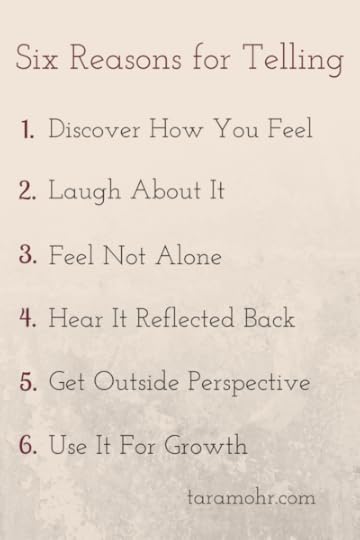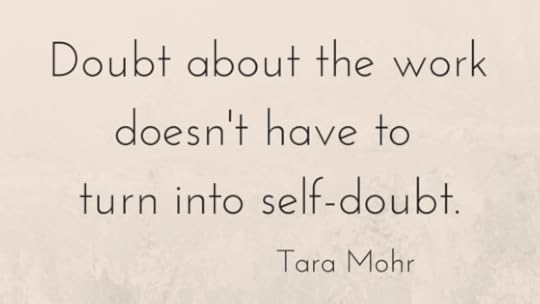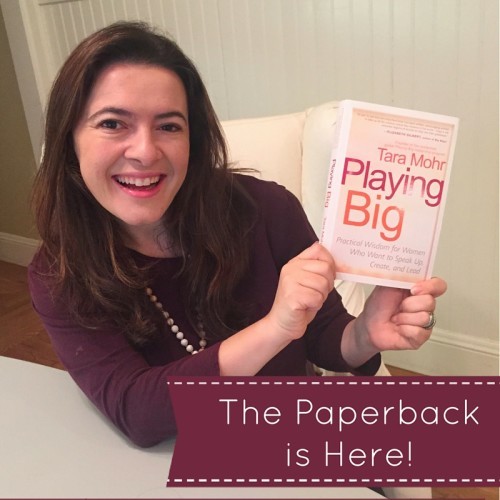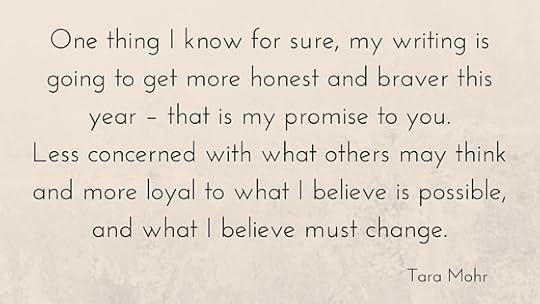Tara Mohr's Blog, page 21
January 27, 2016
I’ve been busy…
Good morning!
I’ve been quite busy the past few weeks, sharing the messages of Playing Big: Practical Wisdom for Women Who Want to Speak Up, Create, and Lead , now that the paperback is out in the world.
There’s a lot to love about bringing a paperback edition into the world. I’ve lived with the messages of the book for a long time now and feel so at home talking about them. There’s not the same rush and time-crunch as with a hardback book launch, which means we can take more time to talk to specific communities and audiences. And the tremendous growth of podcasting has made it possible for me to have many more in-depth, long-form conversations with hosts about the messages in the book.
Here are a few of those recent podcast interviews, all on great shows that I’m excited to introduce you to, if you don’t know about them already. If you are looking for some inspiration around your playing bigger, these interviews about the big ideas from the book can help!
Harvard Business Review Ideacast
Being Boss: A Podcast for Creative Entrepreneurs
The Lively Show with Jess Lively: Add A Little Extra Intention to Your Life Everyday
I also had a blast filming an episode of the Home & Family talk show. We talked about how and why women sometimes undermine themselves with their words, and how that’s different than intentionally “softening” what you have to say.
I also want to let you know about a couple upcoming, public speaking events I’ll be doing this spring.
Upcoming Speaking Events
March 5-6, Woven Web Summit (San Francisco, CA)
April 21, Watermark Conference for Women (San Jose, CA)
Beyond that, I’m continuing to roast veggies, make (and then drink) great coffee, squeeze in a date night with the hubs here and there, hang out with my wondrous little guy and marvel at his existence. And I’m seriously craving the time to dig into my next book project. Can’t wait for that.
Love to you –
January 20, 2016
6 Kinds of Conversations
Lately, I’ve been thinking about conversations, and particularly, the therapeutic use of them in my life.
When I’m sad, angry, irritated, confused, I know it’s time for me to do some work to process how I’m feeling — to let the feelings be felt, so that I can unearth what they have to tell me, and then move forward.
I have a trifecta of tools I use to do that – three powerful modalities that assist me: writing, talking, and prayer. In other words, sometimes, I choose to write out what I’m feeling. Sometimes I choose to pray about it, turning the situation and my feelings over to something much greater than me, and asking for guidance, clarity, help. And often, I work through what’s going on by talking about it with a friend.
Today, I wanted to dive into that – how we can help each other work through difficult situations through conversation.
One of the places we get into the most trouble in important conversations with loved ones is in confusion about what kind of conversation we’re having. Maybe you just wanted someone to listen to you with love, but instead you got an advice lecture. Or maybe you were dying to hear your friend’s honest perspective, but she didn’t want to be intrusive, so instead just said a bunch of empathetic, “I’m so sorry’s!” and, “That sounds so hard.”
Today, I want to share six “reasons for telling,” six different reasons we might want to share about a difficult situation with a friend or a loved one.
Use this list to help you discern what you want from a specific conversation. Knowing what kind of support you want in a conversation, and communicating that, is one way to take really great care of yourself.
You can also use this list as a listener, to remember the different ways you can be of support in a conversation, and to ask for clarification from the speaker about what they are looking for.
Six Reasons for Telling
1. To discover what you think and feel. Talking to a patient listener whom we love and trust, we often make surprising and important discoveries about how we really feel. “This is what really hurts about what happened.” “You know? As I’m talking I’m realizing, my real fear here is this …” Or “Gosh, this feels so familiar. I think this is connected to how I used to feel with my family.” It’s in the unfolding, the unpacking, the unraveling of the knots of thoughts and feelings that we can bring each into the light and discover what’s truly going on for us.
2. To laugh about it. I do this one so much with my friends that sometimes now, even in the midst of something challenging happening, I have the thought, “I can’t wait to tell x about this so we can laugh about it.” Situations that can feel so irritating, or out of control in the moment, can become absurd and hilarious when related to a dear friend. Laughter is therapeutic, and shared laughter over what challenges us is incredibly healing.
3. To not feel alone. We share to hear, “Oh I’m so sorry that happened to you.” Or, “That is appalling. I can’t believe she did that! I’m sorry honey.” Empathy, validation, solidarity, love. When we don’t feel so loved by life, or when circumstances are hard, it helps to hear from others that they don’t want us to hurt or suffer, that we are not alone. We get a little more stamina for the journey ahead. We’re buoyed up by others’ love for us.
4. To gain clarity by hearing your feelings reflected back to you. Sometimes, we don’t quite know how we feel, even as we talk about something. But a good listener can reflect back to us what they are hearing: “It sounds like you had some expectations and you’re feeling disappointed.” “I know you’re saying you are angry, but I’m also hearing that you are really scared.” If their assessment is right, we feel heard. We get clarity. But even if they are wrong, their wrong assessment will help us discover what we are really feeling. The other person might say, “It sounds to me like you just want to make a decision on this.” “No, that’s not quite it,” you might say, “I think it’s more that I want to better tolerate this time of uncertainty.” Together, through the back and forth, you can uncover what’s true for you.
5. To get outside your own perspective, and hear someone else’s. We’re all familiar with this one – because it’s quite overused in our culture. We share because we want to hear what someone else thinks about the situation, what they would advise us to do, what they think is right. This can be wonderfully valuable – if we have advisors we admire and trust – and if we know how to discern what advice resonates for us and what advice isn’t really right for us.
6. To use the difficult situation for our own growth. This is where things get magical. When we share about a difficult situation in our lives, not just to vent, not just to clarify how we are feeling, and not even just to get support, but then to consider with someone else: what is this situation really about, in terms of the learning curriculum life is giving me? How does this situation offer me an opportunity to leave behind an old pattern, heal an old wound, be better to others or myself in some particular way than I’ve been before? This is where we get to spin our challenges into the gold of our evolution. In this kind of conversation, it’s the friend that might help us turn away from blaming or feeling attacked, and uncover the higher purpose for which the situation can be used.
To make this practical:
1. The next time someone in your life comes to you with a problem or difficult situation (a mentee, a team member at work, a child or other family member, or a friend), ask them, “What kind of support would you like from me here?” Give them some ideas if they aren’t sure what you mean – “Just listening, or advice, or helping you unpack what you want here?”
2. Think of one situation in your life right now that you’d like to talk over with a dear friend or loved one. What kind of support do you want from them around it? Clarify this for yourself and ask for it.
Let me know how it goes.
Love,
Tara
January 14, 2016
on self-doubt
Earlier this week, I heard one of those things that stopped me in my tracks, and immediately made me think: That’s important. That’s helpful. I want to share that with my tribe.
I was talking with a remarkable woman who is the founder and CEO of one of the U.S.’s largest women-owned companies. She said, “I think that for anyone in any type of leadership position, if they don’t have doubts and question what they are doing, they aren’t doing a good job.”
I’d heard that kind of thing before, but this time, I heard it in a new way.
As she spoke more, I got the sense of her continually being in a space of inquiry about her company’s direction, strategic choices, and more. She was asking in an ongoing way, are we on the right path? What might we not be noticing in terms of opportunities or obstacles coming up?
But here’s what’s really captivated me: I could hear in her voice that she did all that “doubting” without a shred of self-doubt. She embraced doubt about the decisions made, the directions being pursued, the assumptions being held about the market and her customers, but didn’t think that having those doubts meant she wasn’t a capable leader.
In fact, she saw doubting as a necessary behavior for effective leaders. So if anything, it strengthened her confidence in herself as a leader.
Listening to her, I understood this: if you are awake to your work, you’ll be confronted with a lot of decisions where there is not – or not yet – a clear right answer. If you are a teacher, you’ll be doubting whether certain things about your teaching are really working, and looking for better solutions. If you are a manager, you’ll be doubting whether your approach is as empowering as it could be for your people, and exploring what could be. If you are an entrepreneur, you’ll be asking big questions about what your customers really want, and what they want at a deeper level underneath that.
But doubt about the work doesn’t have to turn into self-doubt.
The problem for so many of us is that we think that our uncertainty about whether we’re doing right, or as well as we could, means that we aren’t the right person to do the work – to create, innovate, lead, teach, write – whatever it is we are doing. We don’t tell ourselves the very empowering story that this CEO was telling herself: that the right kind of leader continually questions and doubts, looks critically, and stays open.
I picture it like two tracks that crisscross each other here and there along the way: on one, you are doing your day to day work – delivering your product or service into the world. On the other track – probably the one you move onto when you’re on a walk, or in the shower, or on a long drive home – you reflect on that work. You think on the questions about what the right strategy is, what would best serve the people you want to serve, and how to really meet the need in the world that you want to meet. Yes, you doubt, yet you also know that thoughtful consideration of what’s unclear, what’s uncertain, is simply part of doing the job well.
Love,
Tara
January 7, 2016
The Playing Big Paperback!
I’m so, so excited to share with you today the beautiful new paperback version of Playing Big, just released into the world.
I love the beautiful cover on this new version. I adore our new subtitle, “Practical Wisdom for Women Who Want to Speak Up, Create and Lead.”
I’m also honored by the beautiful words Elizabeth Gilbert wrote about the book which grace the paperback cover.
And last but not least, I love that this version is a bit smaller in size (but with all the content of course!) and lighter weight than the original, so it’s easy to tote around and to hold in your hands to read.
For the next few months, I’ll be sharing a whole lot about the book in the world. There’s something just wonderful about a paperback launch. I’m more steeped in the material, I have more distance on the writing process, and there isn’t some of the rush of a concentrated publicity period that happens with an original hardcover release. So we can take our time talking with incredible interviewers, journalists, women’s groups, companies, school communities and more about the messages in the book.
I hope you’ll pick up your copy and maybe one or two for special people in your life, too.
You can buy the book here at Amazon, Barnes & Nobles, IndieBound, BAM!, or your local bookstore.
With love and gratitude,
Tara
January 5, 2016
A New Year’s Update from Tara
It’s 9:17 a.m. and I’m at the desk, sitting down to the empty page to write to you. This post is a personal New Year’s update, on where I’m at and what is coming next.
Before becoming a mother, I woke up, no alarm, because I was just done with sleeping (what a concept) around 6 a.m.
I’d grab my laptop and in the stillness of early morning, sit down at my dining room table to write. I’d work deeply for a couple hours – writing a blog post or a new article, or a poem, or a book chapter.
Around 9 a.m., I’d be spent, done with that highly focused and glorious creative time. I’d make myself breakfast and chat with my husband, who’d just be getting up.
Today, I wake up very differently. I open my eyes because a little boy is saying, “Mama. Mama. Maaaamaaaa. Maaaaamaaaa!!!”
I carry him as he reorients himself to his room, our house, this earthly realm. He wakes slowly.
I make coffee for me and breakfast for him. We play. There are more than a few heart-bursting with joy moments.
The kitchen gets newly strewn with sippy cups and playdough and half eaten eggs. I feel again like I’m losing the battle against this new quantity of stuff, and this new level of mess.
We transition, slowly, to whatever he’ll be doing next – usually time with another important grown-up in his life.
After all that, I make my way downstairs to this desk to write. The world is not silent as it used to be during my writing time. It’s buzzing already. I’m not close to my dreams like I used to be when writing. My mind is not empty. I’ve done a hundred things already and my being is full of them. And of course, I’m far more tired than I used to be.
But thankfully, the empty page takes me back, almost as well as early mornings did, to that spacious place from which we create.
About a year ago, I wrote that I feel completely reorganized by motherhood. It’s only become truer, the reorganization more deep and bewildering and complete.
I am in that process of letting go of the old and finding my way through a foggy new landscape to the next emerging me, and the life she’ll have.
My friend Lianne Raymond sees the chapters of our lives in terms of metaphors of organic growth – times for planting seeds, times for putting down roots, times for branching out and bearing fruit. I sense that the past decade or so for me was one of branching out and bearing fruit. And now is root time. Rooting down. I feel soft, heavy, humble.
I do not anticipate that my work will become less important to me. But it has already become less important to my ego. Hunger for accolades and achievement seems to be slipping away. The interest in what’s already here is greater, for me, than it’s ever been. And the call to be more courageous in my work is strong.
One thing I know for sure, my writing is going to get more honest and braver this year – that is my promise to you. Less concerned with what others may think and more loyal to what I believe is possible, and what I believe must change.
And, I’m so excited that with this new year, the Playing Big paperback book is out in the United States. (My next post will be about this – stay tuned to see the beautiful new cover and hear all about what I’m truly so happy about with this edition.)
I’ll be spending much of the several months sharing about the Playing Big book out in the world – lots of podcasts, speaking, and events with women’s groups and increasingly coed groups, too.
On that note, San Francisco Bay Area women, please join me next week to celebrate the paperback release at this event at The Hivery. The Hivery is an incredible organization that I love, and this event is going to be so special.
So, that’s some of what is on the horizon, and what’s in the soil, for me.
What is changing for you? What is present now?
Wishing you a year filled with learning, grace, and connection.
Love,
Tara
December 3, 2015
Two ideas I’m loving…
You might remember my conversation with Whitney Johnson a few years back. I always appreciate her substantive exploration of how women can craft more fulfilling careers, and her unique blending of thinking from the fields of business and psychology.
In the audio conversation below, we talk about her fascinating career path – from music to Wall Street finance to author. Today, I’m excited to share with you two of the many helpful ideas from her new book, Disrupt Yourself. These two provoked big aha moments for me.
1. A New Way of Thinking About Constraints
“Whom the gods wish to destroy, they give unlimited resources.” Those words, written by Twyla Tharp, stopped me in my tracks. They kick off Whitney’s fabulous chapter on the positive power of constraints.
We assume that constraints limit us. That the small amount of time you have to work on a passion project, for example, is a problem. Having only a little knowledge about a topic you want to write about, is a deficit.
Whitney shares in her book how when it comes to creativity and innovation, constraints often help us. The fastest growing startups, it turns out, aren’t those who got ample funding. They’re the bootstrapped ones that operated in an environment of constrained financial resources. Other research shows that too much time or even lots of buy-in from others around a project diminishes a person’s ability to do the project.
Of course, there are dire constraints that cause human beings all kinds of suffering, and yes, we want all human beings to be liberated from those kinds of constraints.
But there are also all kinds of non-dire constraints, particularly in our work, that we think of as negative, but that actually can be helpful. I’ve definitely seen this in my own career. The blog posts I’ve written that have been the most well-received are the ones I’ve written in the shortest amount of time. Having less time in general, now that I’m a parent, has helped me stop over-thinking things and being perfectionistic. I was never more creative as a writer than when I was given a specific prompt – a constrained topic – to write about everyday through a semester in college. And it was an unexpected constraint on technology – a venue with no projector or wired mic – that helped me give the most emotionally connected, flowing, and honest speech I’ve given in my life.
What constraints in your life or work can you think about in a new way? How could they help you?
2. “For the risk averse who are trying to convince themselves to try something new, the trick is not to focus on what will be gained by venturing forth, but to instead focus on what might be lost by standing still.”
When I read these words in Whitney’s new book, I gasped out loud. I suddenly understood my own experience in a new way. Many of you have heard me tell the story of deciding to embark on the career path I’m on now. A pivotal moment happened for me as I was sitting in my living room, up in the middle of the night, thinking about why I was feeling unhappy and what I really wanted.
I had the thought that the next few decades – the central ones in my career – could fly by very quickly as I worked this job with lovely people, that I liked well enough day-to-day, that paid well, and that allowed me to have a balanced life. However, I realized that night that at the end of those decades, I would look back and know I’d been more loyal to my fears than to my dreams.
It was that thought – of the pain and regret I’d feel down the line if I stayed on my current path – that pushed me to do something different. That’s exactly what Whitney is describing in the quote above. Maybe that’s true for you too – that thinking or writing about the downside of not going for your more authentic life (rather than upside of going for it), will help move you into action.
Listen as Whitney and I chat about this and much more – press play or download the audio file below. And learn more about Whitney Johnson’s new book, Disrupt Yourself, here.
Click to Download MP3
Love,
Tara









